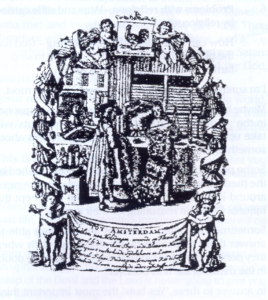OUR COUSINS IN THE NETHERLANDS – TWENTY CENTURIES OF CO-OPERATION
WITHOUT DOUBT, the Netherlands contain a significant portion of the Israelite remnant still outside the main body of Israel which is now embodied in the English-speaking Family of Nations. During the last 2,000 years, by social, political and economic movements, the influence of the Netherlands has been considerable .
Many British and Dutch peoples have a common ancestry from which they have inherited similar qualities. Their passionate love of liberty has made them pioneers of modern democracy and religious toleration. ‘Nations of shop-keepers’ both, their genius for commerce, built up the solid wealth and strength which finally broke the power Of Louis XIV and Napoleon and stimulated the love of enterprise which has made them leading explorers and colonists.
Before Caesar Came
Before Caesar’s conquest of Britain, there were Low Dutch people in Britain who had moved in from Flanders, because of floods there. The Frisians conducted most of the import and export trade before the invasions of the Anglo-Saxons in the fifth and sixth centuries. In the eighth century, England was a centre of learning. Missionaries, like Willi-brod and Boniface, worked among the Frisians. In the latter half of the tenth century, the foreign trade of London laid the foundations of its future commercial greatness. Because of its relations with the merchants of the Dutch towns of Tiel and Dordrecht – the greatest commercial centres of that time – England’s prosperity increased.
Following the Norman Conquest, there came many Flemish weavers who had a large share in the development of England. Dutch immigrants started sheep-farming, which was to contribute so much to England ‘s early greatness. Flemish industrial organisation contributed to the formation of the English guilds of the twelfth and thirteenth centuries. In the twelfth century, Dutch merchants had their own private wharves in London and were members of the Guildhall. At the time of the Conquest, many Anglo-Saxon refugees settled in the Dutch countries. In 1165, for example, Thomas a Becket escaped to Holland.
Wool-Basis of Prosperity
With Dutch help England had, soon after the period of Edward I, become the chief wool-growing country in Europe and the services of the cloth manufacturers of the Netherlands were urgently in demand. The weavers were promised: ‘They shall feed on fat beef and mutton till nothing but fulness shall stint their stomachs.’ Again, thousands of weavers came over as instructors and assistants to the English. England at this time was still a farming country and the capital and enterprise of the Dutch were also courted in this regard, with the result that artisans, linen-weavers, felt-makers and clock-makers were introduced. Dutch printing presses became famous at an early date.
The first complete English Bible came from Holland and Caxton learned his trade in the Netherlands. Many English writers like Wyclif and Thomas More spent some time in Holland and hosts of their countrymen took refuge in the Netherlands during the Wars of the Roses.

The closest relations between England and the Dutch existed in the sixteenth and seventeenth centuries. England was still short of all sorts of manufactures, most of the trade being in Dutch hands: even English fish-markets were supplied by Dutch fishermen. All this stimulated a close contact with Dutch methods, institutions and industries.
A Steady Stream
Intense immigration prepared the way for a Dutch prince on the British throne and, for a large part, England owes a good deal of its subsequent prosperity to the effect of religious persecutions in the Netherlands. In 1527 , when England’s population numbered 5,000 ,000, London alone had 15,000 Flemings. In 1562, 40,000 more arrived and as many in the following years. On the other hand, action against the Plymouth Brethren drove English Protestants to Holland; but Cromwell again sent for Dutch divines as teachers. Thousands of English Protestants were to help the Dutch in their fight with the Spaniards and English religious separatists went to Leyden: some sailed from there on the Mayflower to found New York. The Quakers, like many other sects, were products of Dutch sectarianism-William Penn’s wife and mother were Dutch.
William of Orange
In 1688, William of Orange was invited to England ‘to restore English liberty and to protect the Protestant religion’. After the death of William, close literary relations existed between the two countries. Bearing in mind this long cultural interaction between England and the Netherlands, there is no doubt that the Dutch, have felt themselves to be something more than mere allies.
During the Second World War, the Dutch people played their part in a heroic resistance to the Nazi oppression. Their help and kindness to escaping Allied prisoners was magnificent.
Courtesy of The National Message Jan 1977

